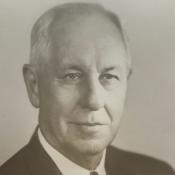George Davis Bailey
 The son of Henry Moore and Mary Louise Davis Bailey was born on June 6, 1890, in Sioux City, Iowa. He graduated from Sioux City High School in 1908. He received a bachelor's degree in 1912 from the University of Wisconsin, where he was one of the early students in the U.S. to major in accounting. In the same year he joined Ernst & Ernst in Cleveland. He was made partner in 1916 and moved to Detroit; he held this position until 1947 when he resigned to start his own firm, George Bailey & Co. Later that same year his firm merged with two other firms to form Touche Ross & Co.; he was an executive partner of this firm until his retirement in 1957. He was certified as a CPA (Wisconsin) in 1917.
The son of Henry Moore and Mary Louise Davis Bailey was born on June 6, 1890, in Sioux City, Iowa. He graduated from Sioux City High School in 1908. He received a bachelor's degree in 1912 from the University of Wisconsin, where he was one of the early students in the U.S. to major in accounting. In the same year he joined Ernst & Ernst in Cleveland. He was made partner in 1916 and moved to Detroit; he held this position until 1947 when he resigned to start his own firm, George Bailey & Co. Later that same year his firm merged with two other firms to form Touche Ross & Co.; he was an executive partner of this firm until his retirement in 1957. He was certified as a CPA (Wisconsin) in 1917.
He was active in professional organizations, in particular the AICPA serving as its president (1947- 48) and its vice president (1943-44). He served the AICPA as chairman or member of some 23 of its committees including Council, Executive Committee (1941-44), and Trial Board, Accounting Procedure (1938-44; chairman 1944-47), Terminology and Relations with the Bar. He was also chairman of a special coordinating committee to study the report of the Commission on Standards of Education and Experience for CPAs (1959). He was vice president of the AAA in 1942. He received the Michigan Association of CPAs' Service Award in 1958 and the AICPA's Gold Medal in 1960.
He was identified as a leader in the advancement of the standards of the profession and the improvement of accounting education at the university level. Among his contributions was the development of closer relations between the legal and accounting profession. He was among the first accountants to recruit candidates to the profession directly from college.
He wrote numerous articles for professional journals. He was a visiting professor at the University of Michigan (1958-59), the Regents' Professor at UCLA (1961-62), and the Dickinson Lecturer at Harvard during the academic year 1947-48. He was a member of the Businessmen's Advisory Committee of Wayne State University. The University of Michigan chapter of Beta Alpha Psi selected him for honorary membership in 1952. He was also a member of Beta Gamma Sigma.
He was active in numerous government, civic, and community organizations, particularly with the affairs of Michigan and the city of Detroit. He worked extensively with the federal government, largely as an unpaid advisor and consultant. Early in World War II, he participated in the formation of accounting and tax decisions in the War Department. He was consultant to the Office of Contract Settlement (1944-45), the Board of Governors of the Federal Reserve System (1955-56, during its study of consumer credit regulations), and the Statistical Division of the United Nations Secretariat (1958-59). He was president, Michigan Council for Tax Research; trustee, Citizens' Research Council of Michigan, and in Detroit he was president, United Community Services (1946-48); director, Board of Commerce (1945-58); and trustee, Grace Hospital, and Visiting Nurse Association. He was active in the formation of the United Foundation, the first organization in the country to unite fund-raising for national and local charities.
He married Edna Gillen in 1916; he later married Fern Crawford in 1962. There were no children by either marriage. An active clubman, he enjoyed fishing, golf, travel, and the Detroit Symphony Orchestra. He collected old English dictionaries and owl figurines. He died December 2, 1966 at the age of 76.
 The son of Henry Moore and Mary Louise Davis Bailey was born on June 6, 1890, in Sioux City, Iowa. He graduated from Sioux City High School in 1908. He received a bachelor's degree in 1912 from the University of Wisconsin, where he was one of the early students in the U.S. to major in accounting. In the same year he joined Ernst & Ernst in Cleveland. He was made partner in 1916 and moved to Detroit; he held this position until 1947 when he resigned to start his own firm, George Bailey & Co. Later that same year his firm merged with two other firms to form Touche Ross & Co.; he was an executive partner of this firm until his retirement in 1957. He was certified as a CPA (Wisconsin) in 1917.
The son of Henry Moore and Mary Louise Davis Bailey was born on June 6, 1890, in Sioux City, Iowa. He graduated from Sioux City High School in 1908. He received a bachelor's degree in 1912 from the University of Wisconsin, where he was one of the early students in the U.S. to major in accounting. In the same year he joined Ernst & Ernst in Cleveland. He was made partner in 1916 and moved to Detroit; he held this position until 1947 when he resigned to start his own firm, George Bailey & Co. Later that same year his firm merged with two other firms to form Touche Ross & Co.; he was an executive partner of this firm until his retirement in 1957. He was certified as a CPA (Wisconsin) in 1917.